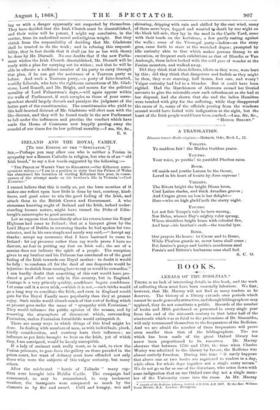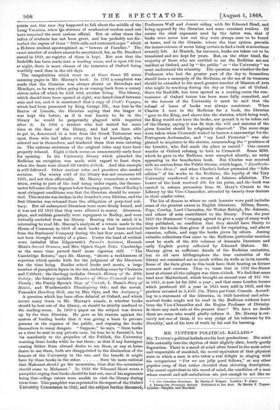BOOKS.
ANNALS OF THE BODLEIAN.*
THERE is no lack of interesting details in this book, and the work of collecting them must have been unusually laborious. We fear, however, that Mr. Macray will not find as many readers as he deserves. The history of a library exteuds over periods which cannot be made generallyattractive, and though bibliographers may applaud, they do not constitute a public. Records of the number of books and MSS. purchased or presented in every single year from the end of the sixteenth century to that latter half of the nineteenth which was so fatal to the pretensions of Dr. Simonides, will only recommend themselves to the frequenters of the Bodleiau. And we are afraid the number of these frequenters will prove even smaller than that of the bibliographers. The use which has been made of the great Oxford library has
never been proportioned to its resources. Mr. Macray observes that between 1730 and 1740, th.; time when Charles Wesley was admitted to the library by favour, the Bodleian was almost entirely forsaken. During this time "it rarely happens that above one or two books are registered to readers in a day, while often for whole days together not a single entry occurs." We do not go RO far as one of the librarians, who notes down with some indignation that on one Oxford race day not a single mem- ber of the University came into the room. As Mr. Macray
Annals of She Bodleian Library, Oxford, .4 fl. 1598, A.D. 1867. By the Rev. William Dunn Macray. M.A. London: Rivingtons.
points out, this race day happened to fall about the middle of the Long Vacation, when te absence of academical readers need not have surprised the most zealous official. But at other times the influx of students has not been great, and has probably not dis- turbed the repose of those "little cells and curtained cages" which a Hebrew student apostrophized as "bowers of Paradise." The exact number of readers cannot be ascertained, for, as Dr. Bandinel stated in 1849, no register of them is kept. But now that the Radcliffe has been made into a reading room, and is open till ten at night, there is more chance of the treasures of Oxford being worthily used than in the old days.
The irregularities which went on at those times fill some amusing pages in Mr. Macray's book. In 1787 a complaint was made that the librarian was always absent on Saturdays and Mondays, as he was either going to or coming back from a curacy eleven miles off which he held with another living. The library, which should have been opened at eight, was found closed between nine and ten, and it is mentioned that a copy of Cook's Voyages, which had been presented by King George III., was lent to the Rector of Lincoln, the librarian saying that the longer it was kept the better, as if it was known to be in the library he would be perpetually plagued with inquiries after it. In 1806 a student who bad waited for some time at the door of the library, and had not been able to get in, denounced in a text from the Greek Testament woe upon those who had taken away the key of knowledge, who entered not in themselves, and hindered those that were entering in. The extreme strictness of the original rules may have been properly relaxed. Eight o'clock seems an unnecessarily early hour for opening. In the University library which preceded the Bodleian an exception was made with regard to feast days, when the doors were closed till twelve o'clock. And this example is still followed. Other ancient rules and practices also needed revision. The wintry cold of the library was not overcome till 1821, and not then effectually. Mr. Macray remembers a winter when, owing to part of the roof being under repair, the thermo- meter fell some eleven degrees below freezing point. One of Bodley's most stringent conditions was that the librarian should be unmar- ried. This statute was broken in the founder's own lifetime, and the first librarian was released from the obligation of perpetual celi- bacy. But all subsequent librarians were more firmly bound, and it was not till 1813 that they were allowed to marry. Almanacs. plays, and rubbish generally were repugnant to Bodley, and were virtually excluded from his library. Bearing this in mind, it is interesting to read Mr. Macray's analysis of a return made to the House of Commons in 1818 of such books as had been received from the Stationers' Company during the last four years, and had not been thought worthy of a place. Under the head of rubbish were included Miss Edgeworth's Parent's Assistant, Hannah More's Sacred Dramas, and Mrs. Opie's Simple Tales. Cambridge at the same time proved itself more rigorous still. "The Cambridge Return," says Mr. Macray, "shows a recklessness of rejection which speaks little for the judgment of the librarians for the time being. Besides school books and music, a large number of pamphlets figure in the list, including some by Chalmers and Cobbett ; the theology includes Owen's History of the Bible Society; the history includes Memoirs of Oliver Cromwell and his Family ; the Poetry Byron's Siege of Corinth, L Hunt's Story of Rimini, and Wordsworth's Thanksgiving Ode; and the novels, Peacock's Headlong Hall, one by Mrs. Opie, and the Antiquary."
A question which has been often debated at Oxford, and which recurs many times in Mr. Macray's annals, is whether books should be lent out of the library, or should be strictly confined to the reading-room. In 1659 a paper on the subject was drawn up by the then librarian. He gave as his reasons against the system of lending books that it was giving a boon to private persons at the expense of the public, and exposing the books themselves to many dangers. "Suppose," he says, "three books at a time be sent to any private man, 'tis true he is furnish'd, but 'tis manifestly to the prejudice of the Publick, the University wanting those books while he has them ; so that if any forreigner coming hither from abroad desire to see them, or any at home desire to use them, both are disappointed to the diminution of the honour of the University in the one, and the benefit it might
have by those books in the other Sure 'tis more rational that Mahomet should go the mountaine, than that the inouutaine should come to Mahomet." In 1833 Sir Edmund Head wrote a pamphlet urging that books should be lent out, one of his arguments being that college tutors were unable to visit the library daring term time. This pamphlet was reprinted in the report of the Oxford University Commission in 1852, and the subject further dimmed, Professors Wall and Jowett siding with Sir Edmund Head, and being opposed by the librarian and some constant readers. Of course the chief argument used by the latter was, that if books were never lent out they were always sure to be found at home, and in the libraries where the loan system prevails the inconvenience of never being certain to find a book is sometimes severely felt. At Munich, for instance, books are taken out to be translated and are kept for years. But, on the other hand, the majority of those who are entitled to use the Bodleian are not resident at Oxford, and by "the public" or "the University" we must understand the minority. The question was whether the few Professors who bad the greater part of the day to themselves should have a monopoly of the Bodleian, or the use of its treasures should be extended to the much greater number of Masters of Arta who might be teaching during the day or living out of Oxford. Since the Radcliffe has been opened as a reading-room the con- venience of Oxford tutors has been more fully consulted, and to the honour of the University it must be said that the refusal of loans of books was always consistent. When Charles I. sent to the Bodleian for a book, the librarian "goes to the King, and shows him the statutes, which being read, the King would not have the booke, nor permit it to be taken out of the library, saying it was fit that the will and statutes of the pious founder should be religiously observed." The same steps were taken when Cromwell wished to borrow a manuscript for the Portuguese Ambassador, and "my Lord Protector" was also pleased to acquiesce in the statute, commending the "prudence of the founder, who tad made the place so sacred." One cannot wonder at Oxford refusing to lend to Cromwell. Some MSS. which he gave to the Bodleian were accepted silently, no entry appearing in the benefaction book. But Charles was received with an oration from the Public Orator, which began, " Excellentes- sime Vice-Deus ;" and when Charles's father presented the "folio edition" of his works to the Bodleian, the loyalty of the Tory University overflowed in a stream of fulsome adulation. The bearer of the book received 20/. for his pains, and the book was carried in solemn procession from St. Mary's Church to the Library by the Vice-Chancellor, attended by twenty-four doctors in their scarlet robes.
The list of donors to whom no such honours were paid includes some of the greatest names in English literature. Milton, Bacon, Pope, Cowley, Lord Clarendon, Sir Walter Raleigh, Dr. Johnson, and others of note contributed to the library. From the year 1610 the Stationers' Company agreed to give a copy of every work they published, on condition that they should have liberty to borrow the books thus given if needed for reprinting, and also to examine, collate, and copy the books given by others. Among valuable collections that came to the Bodleian particular mention must be made of the 800 volumes of dramatic literature and early English poetry collected by Edmund Malone. Mr. Macray gives us sufficient details of the Bodleian curiosities, but to all save bibliographers the true curiosities of the library are contained not so much within its walla as in its records. Some of the facts given in this book have their bearing on former manners and customs. Thus we learn that in 1787 the dinner hour at almost all the colleges was three o'clock. We find that some land near Maidenhead, which brought an annual rent of 91/. 10s. in 1611, is now let for 2201. a year ; and that some London houses which produced 40/. a year in 1611 were sold in 1853, and the produce invested in 3,455/. 10s. Three per Cent. Consols. Accord- ing to a statement of the librarian, in 1620 heretical and schis- matical books might not be read in the Bodleian without leave from the Vice-Chancellor and the Regius Professor of Divinity. Is there any such rule at the present time ? We have no doubt there are some who would gladly enforce it. Mr. Macray is cer- tainly not one of them, if we may judge of his tolerance by his liberality; and of his love of truth by his zeal for learning.































 Previous page
Previous page